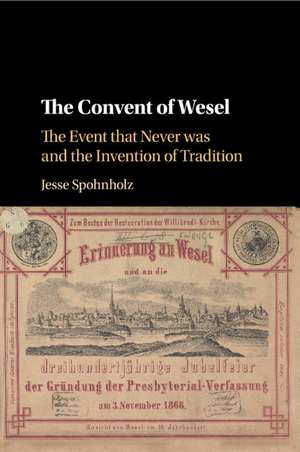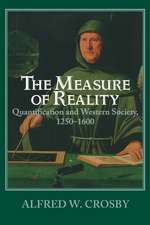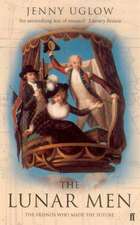The Convent of Wesel: The Event that Never was and the Invention of Tradition
Autor Jesse Spohnholzen Limba Engleză Paperback – 15 ian 2020
| Toate formatele și edițiile | Preț | Express |
|---|---|---|
| Paperback (1) | 285.54 lei 6-8 săpt. | |
| Cambridge University Press – 15 ian 2020 | 285.54 lei 6-8 săpt. | |
| Hardback (1) | 697.82 lei 6-8 săpt. | |
| Cambridge University Press – 27 sep 2017 | 697.82 lei 6-8 săpt. |
Preț: 285.54 lei
Nou
Puncte Express: 428
Preț estimativ în valută:
54.64€ • 57.05$ • 45.22£
54.64€ • 57.05$ • 45.22£
Carte tipărită la comandă
Livrare economică 04-18 aprilie
Preluare comenzi: 021 569.72.76
Specificații
ISBN-13: 9781316643549
ISBN-10: 1316643549
Pagini: 297
Ilustrații: 13 b/w illus. 1 map
Dimensiuni: 153 x 230 x 15 mm
Greutate: 0.4 kg
Editura: Cambridge University Press
Colecția Cambridge University Press
Locul publicării:New York, United States
ISBN-10: 1316643549
Pagini: 297
Ilustrații: 13 b/w illus. 1 map
Dimensiuni: 153 x 230 x 15 mm
Greutate: 0.4 kg
Editura: Cambridge University Press
Colecția Cambridge University Press
Locul publicării:New York, United States
Cuprins
Introduction: the mystery of the Convent of Wesel; Part I. Solving the Mystery: 1. November 3, 1568: a moment of hope; 2. The author; 3. The signers; 4. The impact; Part II. Creating the Mystery: 5. The historical emplotment of the national Synod of Wesel, 1618–1768; 6. The Synod of Wesel in the age of romantic nationalism, 1815–1868; 7. The mystery of the Convent of Wesel, 1868–2000; Conclusion: inheritances.
Recenzii
'Engaging, thoughtful, and witty, Spohnholz's unraveling of a historical myth from the Reformation is both a great tale and a timely and insightful consideration of how and why we read and write history. The questions raised by this important book will challenge scholars, teachers, and students seeking to understand the worlds of early modern religion, and unsettle many of our assumptions about our relationship with the past.' Bruce Gordon, Titus Street Professor of Ecclesiastical History, Yale University, Connecticut
'Jesse Spohnholz tells the story of a document understood to record a heroic moment, as well as a story about how that moment became enshrined in history, that is as gripping as any murder mystery. The Convent of Wesel never happened, but Spohnholz clearly lays out why it was so important for all sorts of people over many centuries to remember a past that did not happen. In our era of fake news and fabricated traditions, The Convent of Wesel provides both a cautionary tale and a defense of the practice of history.' Merry E. Wiesner-Hanks, Distinguished Professor, University of Wisconsin, Milwaukee
'Jesse Spohnholz's lively and detailed explication of the twists and turns of the story of the Convent of Wesel alone would have made this a signal contribution to Reformation and early modern history. But the book is so much more. In sparkling prose studded with penetrating sights, Spohnholz reveals how archives themselves shape evidence and reflects at length on the doing of history. The Convent of Wesel is a must read for all historians and not just for those interested in the Reformation or religious history.' Mary Lindemann, University of Miami
'… Spohnholz's book offers a clear methodological challenge to all historians to consider the origins and provenance of their sources with greater clarity, accounting both for the biases of those who created the sources and the biases of those who categorized and archived them. These methodological implications, which stem from the yeoman's work that Spohnholz has done in tracking the archival history and representations of the Wesel articles, make this book a must read not only for Reformation historians, but for all scholars of early modern Europe.' Christopher W. Close, German History
'By examining a series of now-obscure divines, archivists, and historians from a critical perspective that helps us understand what they saw and how they influenced later interpreters, Spohnholz convincingly shows why we must consider not only the texts of evidence from the past but also their archival trajectories if we wish to understand their meaning and deploy them as evidence ourselves.' Randolph C. Head, American Historical Review
'Jesse Spohnholz tells the story of a document understood to record a heroic moment, as well as a story about how that moment became enshrined in history, that is as gripping as any murder mystery. The Convent of Wesel never happened, but Spohnholz clearly lays out why it was so important for all sorts of people over many centuries to remember a past that did not happen. In our era of fake news and fabricated traditions, The Convent of Wesel provides both a cautionary tale and a defense of the practice of history.' Merry E. Wiesner-Hanks, Distinguished Professor, University of Wisconsin, Milwaukee
'Jesse Spohnholz's lively and detailed explication of the twists and turns of the story of the Convent of Wesel alone would have made this a signal contribution to Reformation and early modern history. But the book is so much more. In sparkling prose studded with penetrating sights, Spohnholz reveals how archives themselves shape evidence and reflects at length on the doing of history. The Convent of Wesel is a must read for all historians and not just for those interested in the Reformation or religious history.' Mary Lindemann, University of Miami
'… Spohnholz's book offers a clear methodological challenge to all historians to consider the origins and provenance of their sources with greater clarity, accounting both for the biases of those who created the sources and the biases of those who categorized and archived them. These methodological implications, which stem from the yeoman's work that Spohnholz has done in tracking the archival history and representations of the Wesel articles, make this book a must read not only for Reformation historians, but for all scholars of early modern Europe.' Christopher W. Close, German History
'By examining a series of now-obscure divines, archivists, and historians from a critical perspective that helps us understand what they saw and how they influenced later interpreters, Spohnholz convincingly shows why we must consider not only the texts of evidence from the past but also their archival trajectories if we wish to understand their meaning and deploy them as evidence ourselves.' Randolph C. Head, American Historical Review
Notă biografică
Descriere
This book solves a centuries-old mystery from the Reformation that forces us to rethink how humans engage with the past.














